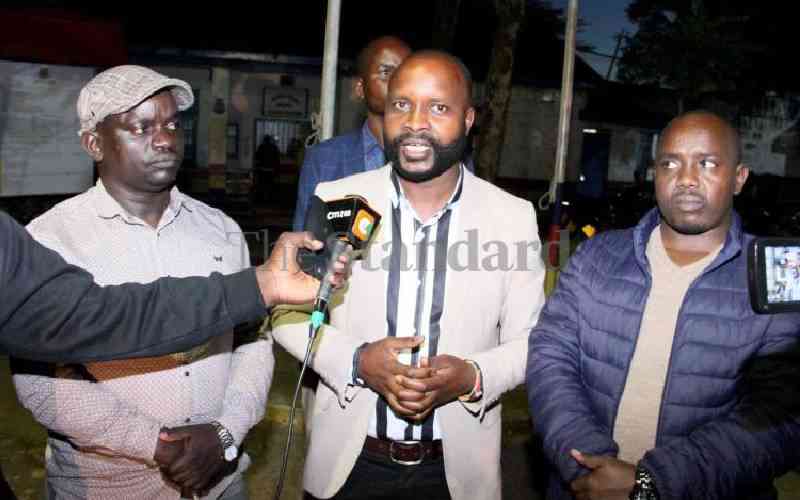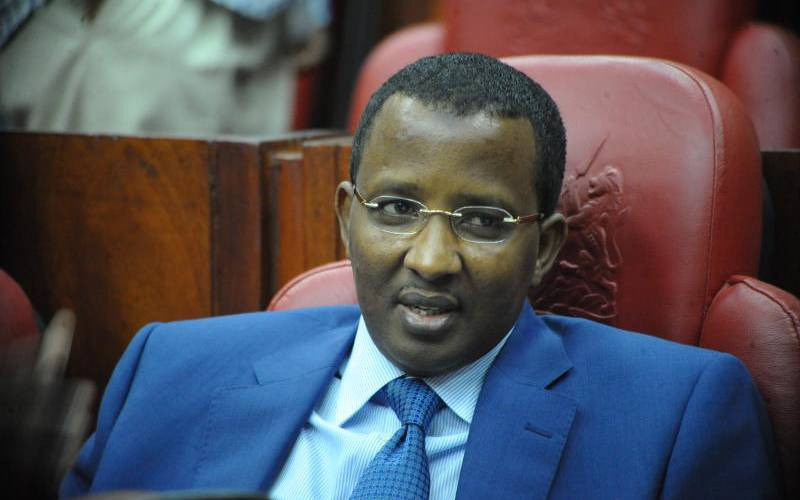 |
|
Internal Security Cabinet Secretary Joseph ole Lenku and former Narok North MP William ole Ntimama (Right). [PHOTOS: FILE/STANDARD] |
By CHARLES NGENO
For four decades William Ronkorua ole Ntimama strode the Maasai land like a Colossus championing the rights of the community, that he claimed were marginalised.
The 85-year old who became the self-styled spokesman of the community served 15 years as the chairman of the powerful Narok County Council and 25 years as a Member of Parliament and Cabinet minister in various capacities.
In the 1990s, Ntimama was blamed for orchestrating attacks against non-Maasai in Narok- which was subject of the Akiwumi Commission of Inquiry into the 1992 ethnic clashes — blamed for uprooting of thousands of the Kikuyu from parts of Rift Valley.
As the de facto community leader, Mr Ntimama could not stand anyone who messed with the rights of the Maasai. But in the March 4 General Election, he lost his Narok North parliamentary seat to Moitalel ole Kenta, a new comer in the Maasai politics.
His daughter Ms Lydia Masikonte who was contesting for the County Women Representative seat also lost in the election. Ntimama’s loss has now created a leadership vacuum among the Maa, according to some political analysts from the region.
Have a vision
They argue that his exit has ‘orphaned’ the region in terms of political leadership. According to the Maasai professionals chairman Joseph Sonkori the leadership void might not be filled anytime soon because he sees no leader who can fit in Ntimama’s shoes.
He says most current leaders are eco-centric, self centered, not pro-active and don’t have the interest of the people at their hearts.
“Ntimama was able to unite the community because he had passion and the community’s interest closest to his heart. Most of the leaders we have now neither have a vision nor conviction thus lacking the inspiration to lead our community,” says Mr Sonkori.
But Narok Central Business District Chairman David Sankok though conceding that there is a leadership vacuum differs with Sonkori.
Mr Sankok says the mantle is being taken over by Interior Cabinet Secretary Joseph ole Lenku who he says has been championing for the rights of the Maa speakers.
“Lenku for the short time he has been in the limelight has shown that he is ready to make sacrifices for the cause of the Maa speakers,” he said. Sankok says unlike Ntimama, Lenku is not belligerent in his fight for the rights of the Maa speakers.
He says the Cabinet Secretary portrays a picture of a diplomat as opposed to Ntimama who antagonised other communities with the Maasai with his infamous phrase of ‘lying low like an antelope.’
“His young age and hospitality background puts him in a better position above other leaders. With his knowledge he is able to advice the Maasai on how to economically empower themselves,” said Sankok.
Stay informed. Subscribe to our newsletter
He adds that the Maasai need a leader who can give them direction to surmount challenges in the changing global world, a bill that Lenku suits well.
“Lenku is a progressive leader as opposed to the past leadership that exploited the Maasai with their retrogressive tribal agitations,” says Sankok who adds that for the next fifty years no one from Ntimama’s family will get an elective post. Sankok sees a promising future in Narok West MP Patrick Ntutu as he comes from a prominent family and has been instrumental in uniting the Maasai in several forums.
“Just like Lenku he is young, energetic and his Provincial Administration background gives him a head start,” says Sankok who says the devolved system of governance may disadvantage political leaders.
He states that governors will only be powerful in their counties but have no say in other counties.
This view is shared by Mark Sopia, a political commentator from Narok County.
He says the devolved form of governance has altered the socio-political dimension in the country
“Most Maa speaking counties have witnessed an influx of other Kenyan communities thereby making the Maa community reconsider their political leadership,” says Sopia who adds that there is no political leader currently who can bring the Maasai together.
A former councilor of Ildamat ward and the immediate former director of Dairy Board of Kenya Maison Kuseyo agrees that none of the current crop of political leaders has come out to unite the Maasai.
Strong crusader
He says most of them have reverted back to their regional and clan cocoons but singles out Lenku as the only person who can fit into Ntimama’s shoes.
“Lenku has that national outlook and has been a strong crusader for the cause of the Maasai,” says Mr Kuseyo. He is skeptical when asked if the Ntutu family would take over from Ntimama saying they do not command respect across Maasailand.
“Ntutu would have been the right person to take over from Ntimama but his image is tainted by the Mau debacle. He is accused by the community as having been part of the group that sanctioned the invasion of the Mau Forest,” says Kuseyo.
Ntimama has no regrets whatsoever for his stand to champion for the rights of his people.
He says his crusade against land injustices committed against the community has paid off since locals are more aware of their land rights.
“We never succeeded in returning land, but we have ensured young people know they were robbed. They are now conscious of their rights and could fight for a restoration of their lost heritage,” he said.
Ntimama was born in Melili sub-location of Narok District and schooled at Narok Massai Government School between 1937 and 1944.
He then went to Kahuhia Teacher training college in Murang’a. Thereafter he taught in several primary schools between 1947 and 1958.
In 1958, he was appointed a Clerk to the Narok District Council and a year later nominated a Councilor in the pre-Independence Narok African District Council.
 The Standard Group Plc is a
multi-media organization with investments in media platforms spanning newspaper
print operations, television, radio broadcasting, digital and online services. The
Standard Group is recognized as a leading multi-media house in Kenya with a key
influence in matters of national and international interest.
The Standard Group Plc is a
multi-media organization with investments in media platforms spanning newspaper
print operations, television, radio broadcasting, digital and online services. The
Standard Group is recognized as a leading multi-media house in Kenya with a key
influence in matters of national and international interest.
 The Standard Group Plc is a
multi-media organization with investments in media platforms spanning newspaper
print operations, television, radio broadcasting, digital and online services. The
Standard Group is recognized as a leading multi-media house in Kenya with a key
influence in matters of national and international interest.
The Standard Group Plc is a
multi-media organization with investments in media platforms spanning newspaper
print operations, television, radio broadcasting, digital and online services. The
Standard Group is recognized as a leading multi-media house in Kenya with a key
influence in matters of national and international interest.









